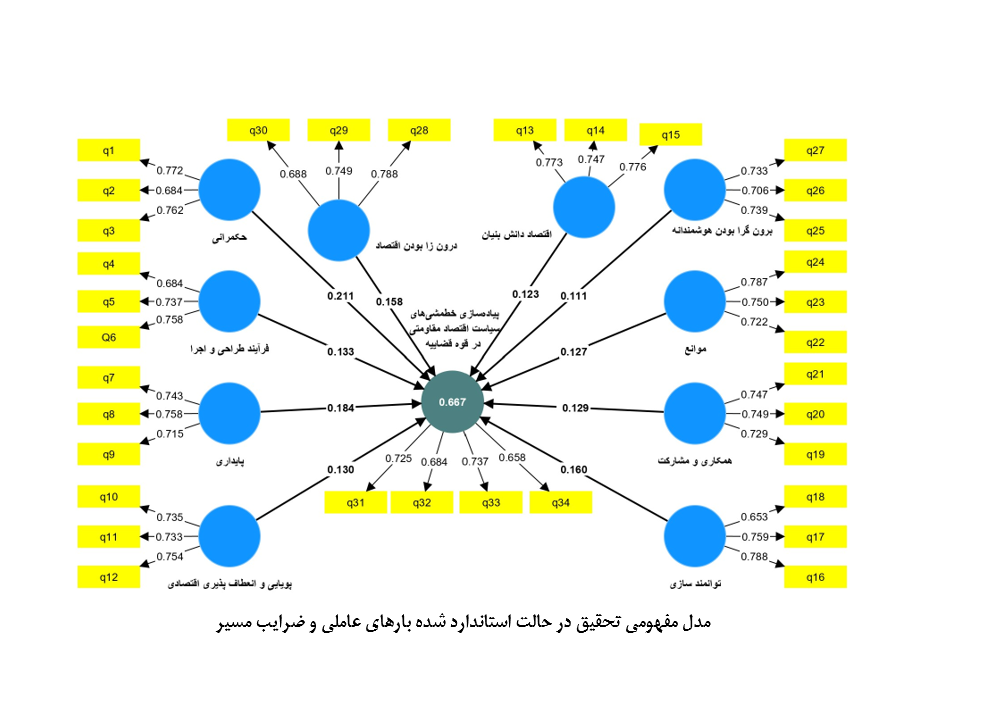The Impact of Influential Factors on the Successful Implementation of Resistance Economy Policies in the Judiciary
Keywords:
Policy, Resistance Economy Policy, Judiciary, GovernanceAbstract
In today’s complex and ever-changing world, social and political systems are faced with rapid transformations that demand dynamic adaptation and greater resilience across all branches of governance. Within this context, the resistance economy has emerged as one of the strategic pillars for the development of independent and self-reliant countries, playing a key role in achieving economic independence, strengthening domestic capacity, and countering external pressures. Therefore, the present study aims to examine the impact of influential factors on the successful implementation of resistance economy policies within the Judiciary. This research is quantitative in terms of data type and applied in terms of purpose. The quantitative statistical population consists of 365 experienced judges, deputies and managers of the Judiciary, legal-economic experts, and members of oversight councils, selected through a convenience sampling method. Data collection was conducted using a researcher-made questionnaire. Reliability was measured through composite reliability and Cronbach’s alpha. Structural equation modeling was performed using PLS4 software. Ultimately, the findings indicated that there are significant relationships between governance factors, policy design and implementation processes, sustainability, economic dynamism and flexibility, knowledge-based economy, empowerment, cooperation and participation, barriers, intelligent outward orientation, and endogenous economic orientation with the implementation of resistance economy policies in the Judiciary. The proposed model was found to have acceptable fit. To achieve the objectives of these policies, serious attention to these factors and corresponding structural and strategic reforms is essential.
Downloads
References
Paighami A, Samieinasab M, Soleimani Y, Seyyed Hosseinzadeh Yazdi S. Essays on the Resilient Economy: Iran's Economic Sanctions, Foundations, Dimensions, and Solutions. Tehran: Imam Sadiq University Press; 2015.
Rizaneh J, Fazeli MJ. The strategic role of the judiciary in the resilient economy. Entrepreneurship Index. 2018;3(7):86-99.
Mahboubi H, Fazeli A. The role of the judiciary in achieving the goals of the resilient economy. Tehran2014.
Elokaby MA. Development of cybersecurity laws in Egypt and its impact on the judicial system (Opportunities and challenges). International Cybersecurity Law Review. 2024:1-22. doi: 10.1365/s43439-024-00132-2.
Schulzke M, Caroll AC. Culture and the court: The judiciary as an arbiter of cultural disputes in the USA. Cultural Studies and the'Juridical Turn': Routledge; 2018. p. 363-88.
Rubasundram GA, Rasiah R. Corruption and good governance. Journal of Southeast Asian Economies. 2019;36(1):57-70. doi: 10.1355/ae36-1f.
Zandi Khvari S, Hosseini M, Mostahfezyan K, Khavarash. Developing a model for public policy-making indicators in the sports of the Islamic Republic of Iran. 2025.
Keshavarian Azad E, Etebarian Khorasgani H, Peykani H, Mehrban, Shahnooshi. Designing a model for implementing judicial policies in the country's judicial institution. Public Management. 2022;14(1):129-64.
Tew Y. Strategic judicial empowerment. The American Journal of Comparative Law. 2024;72(1):170-234. doi: 10.1093/ajcl/avad040.
Kochel TR, Skogan WG. Accountability and transparency as levers to promote public trust and police legitimacy: Findings from a natural experiment. Policing: an international journal. 2021;44(6):1046-59. doi: 10.1108/PIJPSM-04-2021-0062.
Silva J, Silva A, Araújo A, Silva A. Agile Project Management in Government Software Development: Addressing Challenges in Education Public Policy. 2025.
Lv DD, Cho E. Carbon-zero agility: Enabling carbon-zero organizations through agile management and ambiguous feedback algorithms. Environmental Modelling & Software. 2024;177:106062. doi: 10.1016/j.envsoft.2024.106062.
Sánchez Ramírez S, Guadamillas Gómez F, González Ramos MI, Grieva O. The effect of digitalization on innovation capabilities through the lenses of the knowledge management strategy. Administrative sciences. 2022;12(4):144. doi: 10.3390/admsci12040144.
Buchwald EM. Goal setting as the core of strategic planning. Bulletin of the Institute of Economics of the Russian Academy of Sciences. 2025(1):7-23. doi: 10.52180/2073-6487_2025_1_7_23.
Quaranta FR. Innovation and Digitization of the Justice System. 2023.
Dovers S, Hussey K, Clement S. Environment and sustainability: a policy handbook: The Federation Press; 2024.
Rousta A, Allaf Jafari E. Impact of environmental knowledge, responsibility and concern on sustainable consumption behavior: does customer attitude matter? Management of environmental quality: An international Journal. 2024;35(8):1858-77. doi: 10.1108/MEQ-06-2023-0166.
Rostovschikov IV, Aleshkova IA, Molokaeva OK. Judiciary Power and Information Society: New Approaches and Opportunities. Ubiquitous Computing and the Internet of Things: Prerequisites for the Development of ICT2019. p. 185-93.
Radhanpurwala S, Trivedi N, Pandya J. Influence of External Factors upon the Judiciary. Issue 2 Indian JL & Legal Rsch. 2023;5:1.
Squatrito T. Judicial diplomacy: International courts and legitimation. Review of International Studies. 2021;47(1):64-84. doi: 10.1017/S0260210520000352.
Kotter E. Planning and Goal Setting. AI Implementation in Radiology: Challenges and Opportunities in Clinical Practice: Springer; 2024. p. 33-50.
Osewe JO, Gindicha JY. Effect of training and development on employee satisfaction: a case of the judiciary of Kenya. European Journal of Humanities and Social Sciences. 2021;1(3):661-7. doi: 10.24018/ejsocial.2021.1.3.50.
Njuri G. Organization culture and performance of the judiciary in nyeri county, kenya. Nairobi: Kenyatta University; 2019.
Mo J. Promoting Whole-Process People's Democracy following the Rule of Law. Frontiers L China. 2022;17:567.
Morgado M, Lopes C, Morgado S, Freire I, Fonseca O. People Centeredness. 2018.
Li Q, Zeng Fe, Liu S, Yang M, Xu F. The effects of China's sustainable development policy for resource-based cities on local industrial transformation. Resources Policy. 2021;71:101940. doi: 10.1016/j.resourpol.2020.101940.

Downloads
Published
Submitted
Revised
Accepted
Issue
Section
License
Copyright (c) 2025 Mohammad Reza Shahriari (Author); Alireza Rousta (Corresponding author); Seraj al-Din Mohammadi (Author)

This work is licensed under a Creative Commons Attribution-NonCommercial 4.0 International License.










